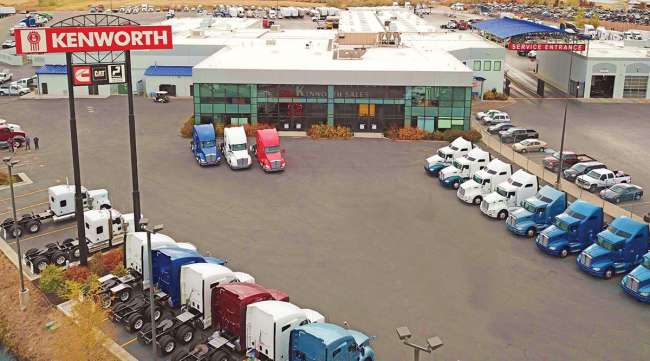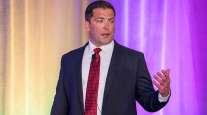Senior Reporter
ATA Chairman Dellinger Presses Truck Excise Tax Repeal

[Stay on top of transportation news: Get TTNews in your inbox.]
WASHINGTON — American Trucking Associations Chairman Dennis Dellinger on Jan. 22 called on a House panel to repeal a World War I-era excise tax on new trucks.
A repeal of the long-standing 12% tax on commercial vehicles would facilitate upgrades to fleets and enhance safety and efficiency industrywide, the chairman said during a Highways and Transit subcommittee hearing.
“Initially implemented as a 3% tax to offset the cost of American participation in World War I, this tax has grown to be one of the highest excise taxes on any good in the United States,” Dellinger, CEO of Claremont, N.C.-based Cargo Transporters, told lawmakers as he further emphasized its repeal would reduce the cost of cleaner and safer new model trucks.
“As it adds over $20,000 to the cost of a new $180,000 truck and $6,000 to the cost of a new $50,000 trailer,” the ATA chairman added, “this onerous charge creates a disincentive to putting new equipment that is cleaner and safer than ever before on our nation’s highways.”

Dellinger
During several recent White House administrations, prominent freight stakeholders joined ATA in urging Congress to repeal the tax. At the hearing, the ATA chairman also pressed the panel on the need to expand nationwide access to truck parking. Increasing parking availability is a priority for the trucking industry.
“The lack of available truck parking significantly impacts not only the health and well-being of truck drivers but also driver utilization and efficiency. On average, truck drivers lose approximately $5,500 annually in direct compensation — equivalent to a 12% reduction in yearly pay — due to time spent searching for parking,” Dellinger continued.

Bost
Recent bipartisan legislation meant to address the industry’s concerns specific to the excise tax and access to truck parking have not been enacted. Rep. Mike Bost (R-Ill.) is among the transportation policymakers focused on advancing bipartisan truck parking legislation. The congressman said during the hearing: “Many states have indicated they don’t have enough truck parking capacity, which we know affects highway safety, supply chain, efficiency, driver recruitment and retention.”
The hearing kicked off the Republican-led chamber’s consideration of big-picture updates to the nation’s highways. Policymakers have less than two years to reauthorize federal surface transportation programs. Arriving at a long-term funding system designed for the federal highway networks is a priority for Congress. The federal Highway Trust Fund uses revenue from the fuel tax to assist states with construction and maintenance projects. The fund is backed by revenue from the federal 18.4 cents-per-gallon tax on gas and 24.4 cents-per-gallon tax on diesel.
“Highway funding relies on a ‘user-pays’ principle,” explained Highways and Transit Subcommittee Chairman David Rouzer (R-N.C.). “It’s pretty simple: You purchase fuel to fill up your vehicle to use the roads, and our fuel taxes go into the Highway Trust Fund. However, electric vehicles, which are often heavier than their conventional counterparts because of their batteries, do not pay into the Highway Trust Fund.
“It is wholly unfair that an entire segment of users doesn’t contribute to the roads and bridges they use. This won’t address the greater solvency issue, but we must rectify this, so all users are treated fairly and contribute to the systems on which they rely.”
Want more news? Listen to today's daily briefing below or go here for more info:




